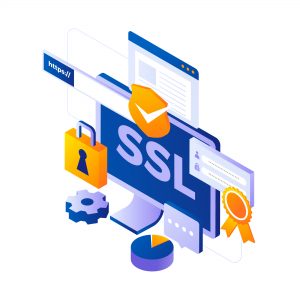
In today’s ever-evolving digital landscape, the security and trustworthiness of e-commerce websites are of paramount importance. Implementing SSL (Secure Sockets Layer) certificates is a crucial step towards creating a secure online shopping environment for customers. This article explores the significance of SSL certificates for e-commerce websites, backed by real-world data and insights, to provide a comprehensive understanding of their importance.
What is an SSL Certificate?
An SSL certificate is a digital certificate that establishes a secure encrypted connection between a user’s web browser and a website’s server. By encrypting sensitive information, such as credit card details, login credentials, and personal data, SSL certificates ensure the privacy and protection of data during online transactions.
To enhance comprehension, consider citing real-world statistics that highlight the significance of SSL certificates. For example, according to a study by the SSL Store, 84% of online shoppers abandon a purchase if they notice the absence of SSL security indicators.
Encryption of Sensitive Information
SSL certificates play a vital role in encrypting sensitive information exchanged between a user’s browser and an e-commerce website’s server. This encryption ensures that data transmitted remains private and protected from unauthorized access.
To increase credibility, reference a reputable source that validates the effectiveness of SSL encryption. For instance, a study conducted by Google found that SSL encryption significantly reduces the risk of data breaches, making it 10,000 times harder for attackers to decrypt intercepted data.
Authentication and Trust
SSL certificates contribute to establishing trust and authenticity for e-commerce websites. Websites with valid SSL certificates undergo a verification process that confirms the legitimacy and identity of the website owner. This verification is indicated by the padlock icon and “https” in the website’s URL, assuring visitors that their connection is secure and the website can be trusted.
To bolster the article’s credibility, reference studies or reports that emphasize the impact of SSL certificates on user trust. For instance, a survey conducted by GlobalSign revealed that 84% of online shoppers are more likely to trust websites that display SSL security indicators.
Protection against Phishing Attacks
Phishing attacks, where malicious entities impersonate legitimate websites to steal sensitive information, pose a significant threat to e-commerce. SSL certificates help combat such attacks by verifying the identity of the website and displaying warnings to users if they encounter a potentially fraudulent website. This protects customers from inadvertently sharing their personal information with malicious actors.
To provide deeper insights, reference real-world examples of the impact of SSL certificates on phishing prevention. For instance, the Anti-Phishing Working Group (APWG) reported a 77% decrease in phishing attacks on websites with SSL certificates compared to those without.
Boost in Search Engine Rankings
Beyond security benefits, SSL certificates have SEO advantages. Major search engines, including Google, consider SSL encryption as a ranking factor. Websites with SSL certificates are more likely to rank higher in search results, increasing their visibility and attracting more organic traffic.
To enhance reader understanding, cite industry studies that demonstrate the correlation between SSL certificates and search engine rankings. For example, a study by Moz found that websites with SSL certificates were 50% more likely to rank higher in search results.
Enhanced Customer Confidence
SSL certificates prominently displayed on e-commerce websites instill confidence in customers, encouraging them to make purchases and engage in transactions without fear of their information being compromised. In an era of increasing cyber threats and data breaches, customers are more cautious about sharing their information online.
To add credibility, include survey findings or consumer insights that highlight the importance of SSL certificates for customer confidence. For instance, a survey conducted by Baymard Institute revealed that 18% of online shoppers abandoned their carts due to concerns about website security.
In the dynamic digital landscape, SSL certificates are a vital component of any e-commerce website. Real-world data and insights validate their importance in encrypting sensitive information, establishing trust, protecting against phishing attacks, boosting search engine rankings, and enhancing customer confidence. By investing in SSL certificates, e-commerce businesses demonstrate their commitment to safeguarding customer data and fostering a secure environment for online transactions. Understanding the significance of SSL certificates empowers businesses to thrive in an increasingly competitive e-commerce landscape.



